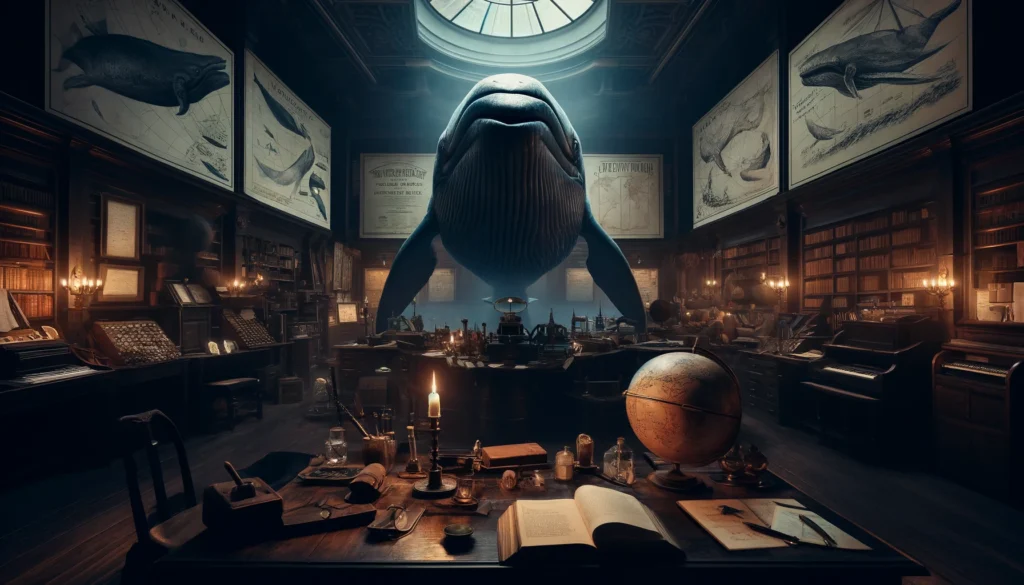“Moby-Dick,” written by Herman Melville, is a literary masterpiece that delves deep into the human psyche and the complexities of existence. At the heart of the novel is Captain Ahab’s obsessive quest to capture the elusive white whale, Moby Dick. This central conflict serves as a profound exploration of fate, obsession, and humanity’s struggle against the unknown. The whale itself becomes a powerful symbol, representing the inscrutable and often indifferent forces of nature that humans strive to conquer but rarely understand.
The narrative is richly layered and filled with symbolism, adding a depth that invites multiple interpretations. Melville’s use of detailed descriptions and a poetic linguistic style enhances the philosophical and existential themes woven throughout the book. These elements combine to create a dense, thought-provoking text that challenges readers to ponder life’s big questions: the meaning of existence, the role of fate, and the limits of knowledge and power.
One of the most notable aspects of “Moby-Dick” is its detailed depiction of the 19th-century whaling industry. Melville provides exhaustive details about the process of whaling, the different types of whales, and the daily life aboard a whaling ship. This not only serves as a vivid backdrop for the narrative but also adds historical and cultural context, offering insights into a bygone era of maritime adventure and exploration.
The novel also stands out for its exploration of human psychology, particularly through the character of Captain Ahab. His monomaniacal pursuit of the whale is portrayed with intense psychological depth, showing how his fixation leads to self-destruction. Ahab’s character raises questions about the nature of obsession and the human propensity to seek dominion over nature, often at great personal and moral cost.
Throughout “Moby-Dick,” Melville employs the sea as a powerful metaphor for the vast, unknowable universe. The ocean becomes a stage on which the drama of human ambition, fear, and desire plays out, illustrating the eternal human quest for meaning in an indifferent world. The philosophical undertones of the novel are amplified by the isolated setting and the often solitary nature of life at sea, highlighting the loneliness and existential dread that can accompany deep self-reflection and confrontation with the natural world.
In sum, “Moby-Dick” is not just a story about a man hunting a whale; it is an intricate study of the limits of human knowledge and power, the destructiveness of obsession, and the inevitable confrontation with the unknown. It remains a profound, compelling work that resonates with timeless themes and questions, making it a staple of American literature and a compelling read for anyone who seeks to explore the depths of human nature and the mysteries of life.
“Moby-Dick” by Herman Melville. Here are five key highlights of this classic novel:
- Complex Narrative and Symbolism: “Moby-Dick” is renowned for its intricate narrative structure and deep symbolism. The white whale, Moby Dick, symbolizes the elusive nature of truth and the human struggle against the unknown.
- Exploration of Human Psychology: The novel delves deeply into the psychology of its characters, particularly Captain Ahab, who is driven by an obsessive quest to conquer the whale. This obsession reflects broader themes of fate, self-destruction, and the human condition.
- Rich Descriptions and Linguistic Style: Melville’s use of language in “Moby-Dick” is both complex and poetic. The detailed descriptions of whaling and the philosophical musings interspersed throughout the narrative offer a rich, immersive reading experience.
- Themes of Existentialism and Fate: “Moby-Dick” addresses existential themes, questioning the meaning of life, fate, and free will. The sea serves as a metaphor for the universe’s vast, indifferent nature.
- Detailed Depiction of Whaling: The novel provides an exhaustive look at the 19th-century whaling industry, including the technical aspects of whaling, the types of whales, and the life aboard a whaling ship. This serves not only as a backdrop for the narrative but also enriches the novel’s historical context.
These elements make “Moby-Dick” a profound and enduring work of American literature.


